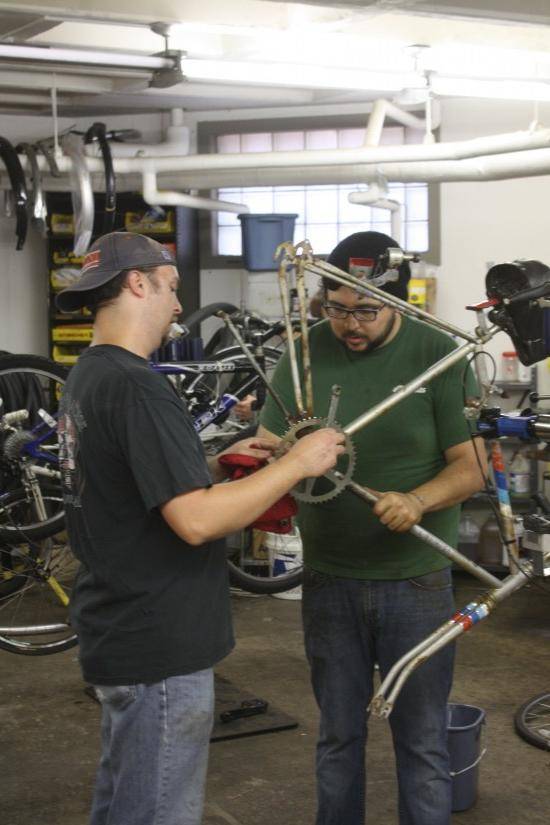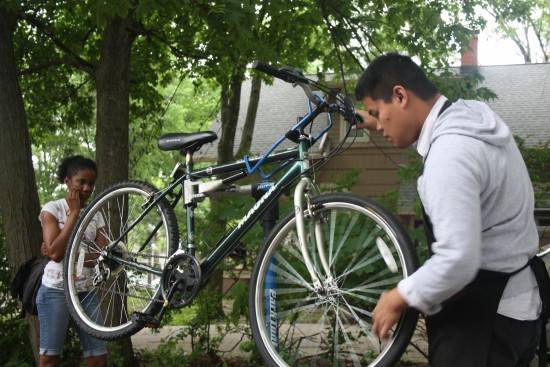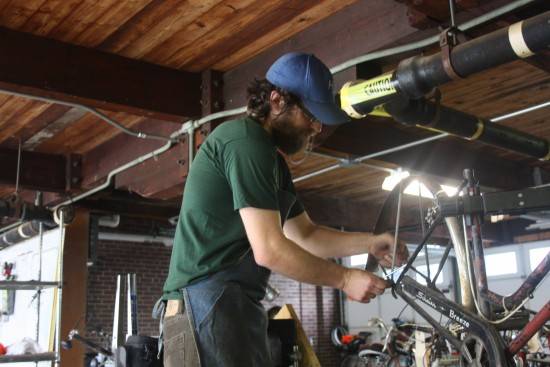 As the general chaos and bustle of graduation has been winding down, the University has been busy rounding up what the students have left behind. Among these things are abandoned bikes or bike parts, left chained up to posts and racks around the campus area, either no longer seen as useful or perhaps totally forgotten.
As the general chaos and bustle of graduation has been winding down, the University has been busy rounding up what the students have left behind. Among these things are abandoned bikes or bike parts, left chained up to posts and racks around the campus area, either no longer seen as useful or perhaps totally forgotten.
Each year, the bikes are collected by University Parking and stored in a University warehouse in the South Farms. Last year the haul reached a whopping 400 and, judging by how this year’s collection has been going so far, this year’s won’t be much different, says Morgan Johnston at U of I Facilities and Services.
WHERE THEY END UP
This great surplus of abandoned bicycle is donated by University Parking — after a grace period during which forgotten bikes can be reclaimed — to The Bike Project, a local nonprofit bike workshop and advocacy group based out of the Urbana Independent Media Center and, as of March 28th, an on-campus location as well at 608 E. Pennsylvania Ave. in Champaign.
The volunteers at The Bike Project take what can be worked with (repair of many of the bikes is beyond feasibility), restore or repair the bikes, and donate or sell them. Last year, 250 bikes went from The Bike Project to Working Bikes, a nonprofit that ships the cycles for re-use in third-world countries including Ghana and Tanzania. However, the majority of these bikes are simply shipped, rust and all, to the non-profit because the manpower for such large-scale repair simply doesn’t exist.
The number of bikes that local volunteers are fully able to repair and give back to the community as donations, to organizations such as the Times Center and the Center for Women in Transition, reached between 15 and 20 bikes last year. Around 100 bikes are repaired and re-sold by The Bike Project to help support their mission.
EDUCATION AND SUSTAINABILITY ARE A BETTER SOLUTION
Rather than attempt to rebuild and donate or sell all of the bikes that get abandoned each year or left sitting in musty garages for untold numbers of years, members at the Bike Project and other bike enthusiasts within the community see teaching and continued basic maintenance as a better solution to the issue.
 At his own cycle workshop, run out of his redone garage on Stoughton St. in Urbana, bike enthusiast Tim Chao (right) stated that business “is more about education than profit right now.” Part stemming from his own passion and part as a response to the growing cycling community in Champaign-Urbana, Chao, along with friend Isaac Tan, started up his shop in the summer of 2009. Since then, his word of mouth business has been in large part about education. “People come in to build their own bike often,” said Chao, who also makes sure that clients return at least once a month for air and lube to ensure longevity of their bikes.
At his own cycle workshop, run out of his redone garage on Stoughton St. in Urbana, bike enthusiast Tim Chao (right) stated that business “is more about education than profit right now.” Part stemming from his own passion and part as a response to the growing cycling community in Champaign-Urbana, Chao, along with friend Isaac Tan, started up his shop in the summer of 2009. Since then, his word of mouth business has been in large part about education. “People come in to build their own bike often,” said Chao, who also makes sure that clients return at least once a month for air and lube to ensure longevity of their bikes.
 At The Bike Project, new members automatically get the opportunity to select any old used bike at the shop, restore it themselves and then keep it, at about half the cost of an already-repaired bike, including the annual membership fee. Along with ridding the shop of one more old bike, this process also instills a great deal of education in the new members.
At The Bike Project, new members automatically get the opportunity to select any old used bike at the shop, restore it themselves and then keep it, at about half the cost of an already-repaired bike, including the annual membership fee. Along with ridding the shop of one more old bike, this process also instills a great deal of education in the new members.
“If we can bring in members of the community that need a bike and help them fix it, our mission is accomplished,” said Campus Bike Project manager Joel Gillespie (above), who hopes that more cyclists will start seeing their bikes as long term assets as opposed to something that can sit for long periods of time or be abandoned. “That’s why there’s 400 bikes out at parking every year, because to some it’s just a disposable thing. They don’t care or they don’t know how to fix it.” To Gillespie, the teaching of bike maintenance and self-sufficiency to bikers can end the problem before it starts.
——
Ed. note: Tom Cyrs wrote this article for a U of I journalism class final project. You can view the pdf of his finished product here.








